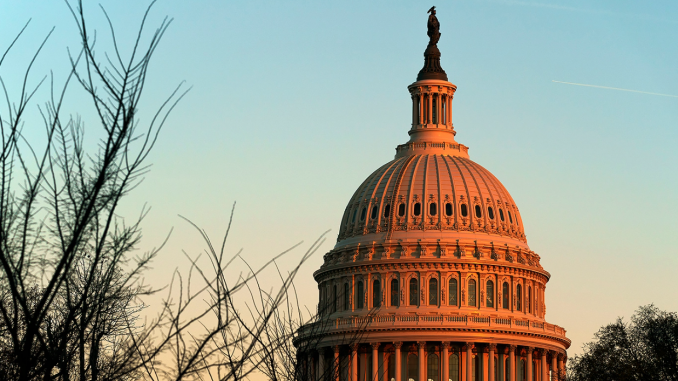
The House on Wednesday passed a short-term funding bill to avert a government shutdown, kicking Friday’s funding deadline to next week to allow lawmakers more time to strike a deal on spending for the remainder of fiscal 2023.
The continuing resolution passed in a 224-201 vote. It now heads to the Senate, where it must pass and be sent to President Biden’s desk before midnight on Friday to avoid a shutdown.
The measure will keep the government funded at current levels until Dec. 23.
Nine Republicans voted with Democrats in supporting the measure after GOP leadership urged rank-and-file members to oppose the legislation shortly after its release the day prior: Reps. Adam Kinzinger (Ill.), Liz Cheney (Wyo.), Chris Jacobs (N.Y.), Anthony Gonzalez (Ohio), John Katko (N.Y.), Jaime Herrera Beutler (Wash.), Fred Upton (Mich.), Steve Womack (Ark.) and Brian Fitzpatrick (Pa.).
In a notice sent out by House Minority Whip Steve Scalise’s (R-La.) office on Tuesday evening, leadership recommended Republicans to vote “no” on the bill, calling it an “attempt to buy additional time for a massive lame-duck spending bill in which House Republicans have had no seat at the negotiating table.”
The GOP faces internal divisions over how to move forward on funding the government.
Some want to freeze current funding levels into next year to allow the newly-elected GOP-led House more say in how the government should be funded for fiscal 2023, which began in October. Republicans are projected to have a 222-212 majority in the chamber at the start of the next Congress.
During a press conference on Wednesday, House Minority Leader Kevin McCarthy (R-Calif.) noted that the top appropriators in the Senate — Sens. Patrick Leahy (D-Vt.) and Richard Shelby (R-Ala.) — are both retiring at the end of this term.
“We’re 20 days before the new members are being sworn in. We’ve got two members leading Appropriations in the Senate who will no longer be here, or be able to be held accountable to the constituents,” McCarthy said.
“We should not move a short-term [continuing resolution] CR. We should move one further into the new year. Allow the American people what they said a month ago — to change Washington as we know it today. We can’t afford to continue to spend the way the Democrats have. The future generation cannot afford it as well,” he added.
Rep. Kay Granger (R-Texas), ranking member on the House Appropriations panel, at the same press conference said a Republican-led House would “work toward a spending agreement that cuts wasteful spending, reduces inflation and prioritizes border security and national defense.”
But other Republicans, including top Senate negotiators and Senate Minority Leader Mitch McConnell (R-Ky.), have expressed support for an omnibus to be enacted sooner, citing concerns about funding for defense and national security.
“We were basically negotiating with the House Democrats and the Democrats here because some of the House Republicans have not shown as much interest in getting an omnibus,” Shelby, top Republican on the Senate Appropriations Committee, told reporters on Wednesday.
McConnell said earlier on Tuesday that lawmakers are “very close to getting an omnibus appropriations bill,” while also setting the timeline for passage by Dec. 22.
Negotiators announced an agreement on a framework for the omnibus late Tuesday, with sights set on moving the forthcoming package through Congress by Christmas Eve. However, the recent announcements contained few details about the deal, including topline figures.
In a letter to Senate Majority Leader Charles Schumer (D-N.Y.) last month, Defense Secretary Lloyd Austin said “operating under a CR moves our budget backward, not forward,” adding that failure to pass a full-year government funding bill “will result in significant harm to our people and our programs and would cause harm to our national security and our competitiveness.”
Via The Hill
